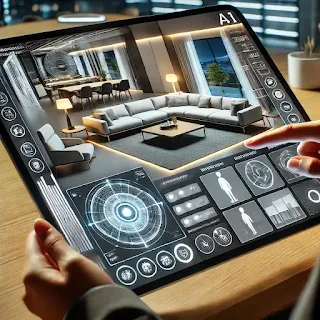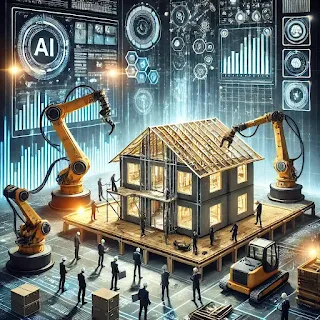The Role of Artificial Intelligence in Home Renovation: Transforming the Future of Living Spaces
- Get link
- X
- Other Apps
The Role of Artificial Intelligence in Home Renovation: Transforming the Future of Living Spaces
Artificial Intelligence (AI) is revolutionizing numerous industries, and home renovation is no exception. In the United States, homeowners, designers, and contractors are leveraging AI-driven tools to enhance creativity, streamline construction, and optimize project management. AI is making renovations more efficient, cost-effective, and personalized, fundamentally reshaping the way Americans approach home improvement.
The Evolution of AI in Home Renovation
Traditionally, home renovation has been a complex, labor-intensive process requiring significant time and expertise. From planning and design to execution, every phase involved meticulous decision-making. However, with AI-powered innovations, the landscape of home renovation has changed dramatically. Homeowners now have access to intelligent tools that simplify design planning, automate construction tasks, and integrate smart home features seamlessly.
This article explores how AI is transforming home renovation in the U.S., the benefits and challenges of its adoption, and the emerging trends shaping the industry’s future.
AI in Home Design: Personalization at Scale
AI-powered design tools have made home renovation more accessible, allowing homeowners to visualize and plan renovations with greater accuracy and ease. These tools analyze user preferences, space constraints, and current design trends to generate personalized recommendations.
Key Benefits:
Tailored Design Suggestions: AI algorithms assess user inputs, including room dimensions and style preferences, to provide customized renovation ideas.
Enhanced Space Optimization: AI evaluates room layouts to suggest efficient furniture placements and spatial configurations.
Real-Time Cost Estimates: AI-driven platforms generate detailed cost breakdowns, helping homeowners budget more effectively.
 |
| AI-driven design software helps homeowners visualize renovations with real-time"AI-driven design software helps homeowners visualize renovations with real-time customization options |
Limitations and Considerations:
Lack of Human Creativity: AI lacks the nuanced artistic intuition of human designers, limiting its ability to create unique design concepts.
Technical Complexity: Some AI tools require users to have a certain level of technical knowledge to maximize their capabilities.
Dependence on Data Accuracy: AI’s effectiveness depends on the accuracy of input data; outdated or incorrect measurements can lead to suboptimal results.
Despite these limitations, AI-powered design software serves as an excellent starting point for homeowners, providing inspiration and facilitating better decision-making throughout the renovation process.
AI in Construction Management: Enhancing Efficiency and Safety
AI is playing a crucial role in modernizing construction management, offering tools that improve efficiency, safety, and cost-effectiveness in home renovation projects.
 |
| AI-p"AI-powered automation is transforming home construction, optimizing efficiency and safety |
Applications of AI in Construction:
Progress Tracking: AI-powered drones and smart cameras monitor job sites in real-time, ensuring compliance with design plans and schedules.
Risk Assessment and Safety Enhancement: AI analyzes historical data to predict potential hazards, improving job site safety.
Resource Allocation Optimization: AI assists in managing materials, labor, and scheduling to reduce waste and minimize delays.
Real-World Example:
During a major home remodeling project in Los Angeles, contractors utilized AI-powered site monitoring tools to generate automated progress reports. This allowed for better coordination among teams and resulted in reduced project timelines and cost savings.
AI in Smart Home Integration: The Future of Home Automation
Smart home technology is rapidly gaining traction in the U.S., with AI playing a key role in making homes more intelligent, energy-efficient, and personalized.
Key Features of AI in Smart Homes:
Home Automation: AI enables automated control of lighting, heating, cooling, and security systems, improving convenience and energy efficiency.
Predictive Maintenance: AI monitors home appliances and systems, alerting homeowners to potential maintenance issues before they become costly repairs.
Personalized User Experience: AI learns user habits and preferences, adjusting settings automatically to enhance comfort and convenience.
Challenges of AI in Smart Homes:
Data Privacy Concerns: AI-powered smart homes collect vast amounts of data, raising concerns about security and privacy.
Usability Challenges: Some smart home devices have complex interfaces, making adoption difficult for less tech-savvy users.
Integration Issues: Different AI-driven systems may not always communicate seamlessly, requiring compatibility solutions.
Case Study: AI-Assisted Home Remodeling
A recent case study highlights the impact of AI in home renovation. A family in San Francisco used AI-driven design software and smart home integration tools to remodel their kitchen. The AI analyzed their cooking habits, lighting preferences, and available space to recommend an optimized layout. The result was a modern, energy-efficient kitchen designed to suit their lifestyle needs.
Challenges and Ethical Considerations
While AI offers numerous benefits in home renovation, several challenges must be addressed:
Accuracy of AI Predictions: AI relies on data inputs; inaccurate data can lead to flawed recommendations and poor design choices.
Cost Accessibility: Advanced AI tools can be expensive, making them less accessible for homeowners on a tight budget.
Human Oversight Remains Essential: AI should complement, not replace, human expertise in design and construction.
Future Trends in AI and Home Renovation
The future of AI in home renovation is promising, with several exciting trends emerging:
AI and Virtual Reality (VR) Integration: Homeowners will soon be able to immerse themselves in virtual 3D models of their renovation plans before implementation.
Sustainable Renovation Solutions: AI will help homeowners choose eco-friendly materials and energy-efficient designs to reduce environmental impact.
Advanced Customization: AI will provide even more tailored home design options, considering personal tastes, lifestyle needs, and functionality.
AI-Powered Collaboration Platforms: New AI-driven platforms will enhance communication between homeowners, contractors, and designers, streamlining project management.
Conclusion
Artificial Intelligence is reshaping home renovation in the United States. From AI-assisted design to automated construction management and smart home integration, these advancements make renovations more efficient, affordable, and tailored to individual needs. While challenges remain, AI’s potential to enhance home renovation is undeniable. As technology continues to evolve, AI will play an even greater role in transforming how Americans design and build their living spaces.
Meta Description
Discover how AI is revolutionizing home renovation in the U.S. Explore AI-driven design, construction management, and smart home automation for more efficient and personalized renovations.
Article Tags
AI in home renovation, smart home technology, AI-powered construction, home remodeling with AI, AI design tools, artificial intelligence in home improvement, future of home renovation
Suggested YouTube Video
AI in Home Renovation: The Future of Smart Living (Ensure the video is relevant and does not infringe on copyright laws.)
Sources
THE INDEPENDENT
BIPARTISAN POLICY CENTER
THE TIMES & THE SUNDAY TIMES
BUSINESS INSIDER
- Get link
- X
- Other Apps




Comments
Post a Comment